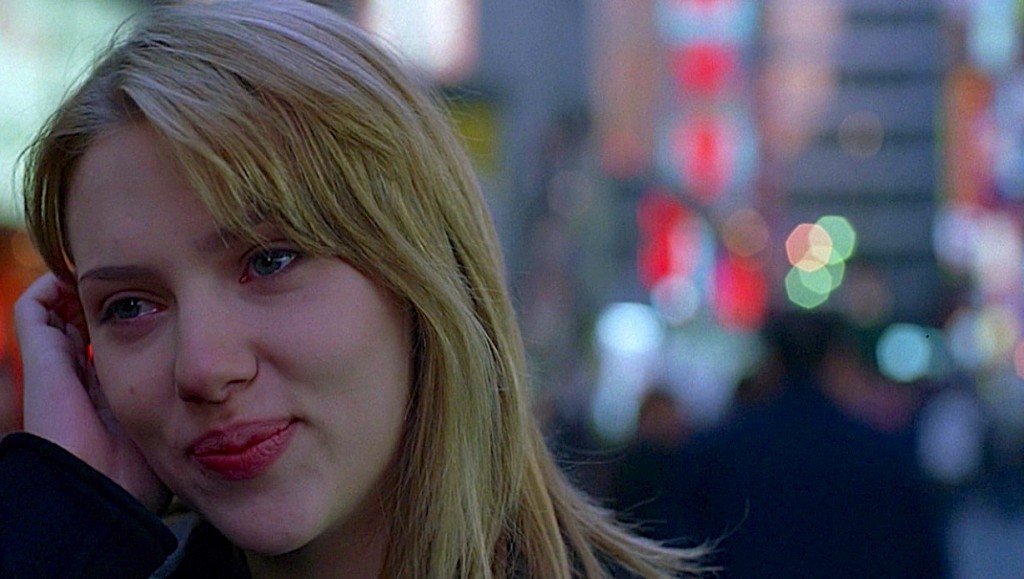Sofia Coppola’s ‘Lost in Translation’ is an introvert’s fantasy. Two lost souls bewildered by life and relationships find themselves unable to translate and comprehend life. Bob (Bill Murray) earns millions for saying two lines for a commercial whereas Charlotte (Scarlett Johansson) is newly married to the eccentric love of her life. They seem to have a life they were ‘supposed’ to have but perhaps they were navigated into the mere illusion of happiness that waits as a trap. Like two lost pieces of a puzzle rolling over an odd board game, they find themselves in Tokyo. The place becomes a manifestation of their fragmented lives where things have recently become unfamiliar.
The city with its lights, glasses and mirror reflect what they are searching for: meaning and direction. Now, families begin to matter less, jokes are less funny, priorities and people change colour and they find themselves stranded in a hotel. They begin to have sleepless nights as life gives incomplete answers to their doubts. They meet inside lifts, on the way back from the gym or the swimming pool or at the lounge. They come closer and find themselves in each other. They begin to understand their language of misery and translate the space and even the silence between them. However, time is running out. He has to leave. They embrace for one last time (or is it?); and then he whispers something in her ear. But what?
What does Bob (Bill Murray) whisper in Charlotte’s ear before they part?
The whisper in ‘Lost in Translation’ stitches two hearts and it overtakes a mere mystery. It remains more than a cinematic effect as the act itself communicates immensely. Curious netizens have come up with their own theories.
If one uses the best headphone with the loudest decibel available, one can perhaps hear the whisper end with “… I am going to call you, okay?” and Charlotte replies with a softer and hopeful “okay.” Then they kiss as if to seal a secret forever. Now the real question is: Do we really want to know what Bob whispers into Charlotte’s ears? Isn’t the entire essence of the whisper dipped in the mystery itself? Then again, what makes the whisper more than a cinematic trick?
Whisper ..or a metaphor?
The whisper takes the form of a metaphor articulating their relationship itself: short, incomprehensible and unforgettable. They both meet at a phase where life does not follow their checklist. His humour is not understood enough and her tastes feel haphazard as if life now speaks a foreign language and is displaced to a new planet. Japan personifies this alien world. The film is one of its kind as it is so well knitted with such intricate metaphors.
The whisper also becomes a meta-narrative. It feels like a story within a story because it bears a context of its own. The film could have ended just as how most love stories end with a kiss but here lies a whisper that adds another conflict to the tale. Its concealed existence speaks of its own and creates a secret passage only meant for the two characters to access as if to remind us ‘it is none of our business what he says to her’. Hence, the whisper gives the characters their own independent space through its inaccessibility. It balances to keep their feelings untouched, sacred and never lost. This transcends the two characters from a film roll to the galaxies where they remain as they remain unaffected by our own projections of what they should be.
The Ending: Short and Sweet
In moving pictures, we get to witness every expression in its exaggerated form, as it is not reality but only a representation of it. Therefore, in order to feel a part of the experience, the engagement needs to take two steps ahead -the blue seems blue-er, the dark seems darker, the pretty feels beautiful and love seems like a fantasy- all meant to bestow a shared experience. Therefore, movies always remain an exaggerated experience of reality making it difficult to reflect the mundane, untouched and sweet omissions that barely gets captured in real life. That is how feelings of tenderness, intimacy and sweet nuances in romantic relationships go missing in movies. In this case, ‘Lost in Translation’ stand apart from all other love stories. Here, the couples never mate. It is the gentle stroke of her hair, the kisses with no tongue and the long glances that speak louder than any dramatic monologue by a lover on his knees. Sofia Coppola knows how the heart fuses with different colours of emotions and how making sense is never the solution. She shows how a whisper could be the best form of a goodbye and how it can complete the undone or perhaps start a rendezvous.
Bob would agree, it was very Japanese: short and sweet.

